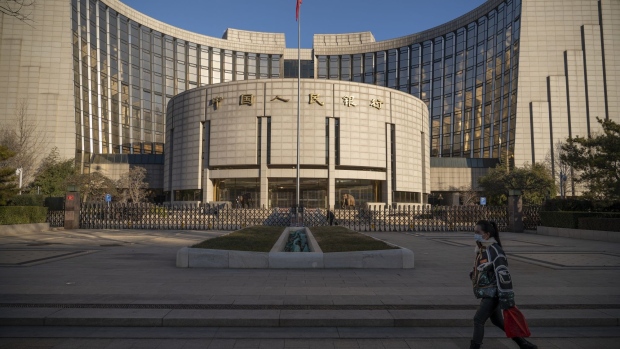Jul 13, 2022
PBOC Sees Liquidity More Than Ample in Sign of Unlikely Rate Cut
, Bloomberg News

(Bloomberg) -- Liquidity in China’s interbank market is more than “reasonably ample,” the head of the central bank’s monetary policy department said Wednesday, an indication that further rate cuts are unlikely.
The 7-day reverse repurchase rate is at around 1.6%, lower than the costs of short-term policy loans the People’s Bank of China provides via its daily open market operations, Zou Lan said at a briefing in Beijing. He was referring to a key interbank borrowing rate. The rate on the PBOC’s 7-day loans for lenders is at 2.1%.
That suggests “liquidity has stayed slightly more than reasonably ample,” Zou said in answer to a question on whether the central bank will continue to cut interest rates or the amount of cash lenders must keep in reserve.
The PBOC has taken a cautious easing path this year, refraining from cutting policy rates since January. It has instead relied more on structural measures to support targeted sectors such as the property industry, small firms and infrastructure projects, and has pushed banks to lend more. Credit jumped more than expected in June due to a rebound in bank loans and record government bond sales.
Governor Yi Gang recently signaled monetary stimulus will likely focus on boosting credit rather than cutting interest rates for the rest of this year, amid concerns over rising inflation and ongoing capital outflows as overseas central banks started tightening. All 18 economists polled by Bloomberg expect the PBOC to hold the rate on one-year policy loans steady on Friday.
Zou said Wednesday that the PBOC is keeping a close eye on domestic inflation as well as shifts of monetary policies in major economies. The Chinese central bank has taken preemptive measures to offset the impact of changes in the external environment on cross-border capital flows and continues to base its policy making mainly on domestic issues, he said.
With the economy showing early signs of recovery in June as Covid outbreaks and lockdowns eased, the PBOC has slashed its liquidity injections in the daily open-market operations since the start of July. That’s sparked speculation that it’s moving toward normalizing interbank cash conditions. Previously it kept liquidity flush from April as the virus spread, creating a glut of cash that wasn’t able to make its way to the real economy.
Still, “arduous efforts” are needed to stabilize the economy, which continues to face “relatively big uncertainty” in the second half of the year, Zou said.
The PBOC will strengthen the implementation of already-announced policies such as the structural measures and the 1.1 trillion yuan in additional policy bank funding for infrastructure, while it has also reserved “sufficient” policy room and tools to tackle “unexpected new challenges,” he said.
©2022 Bloomberg L.P.






